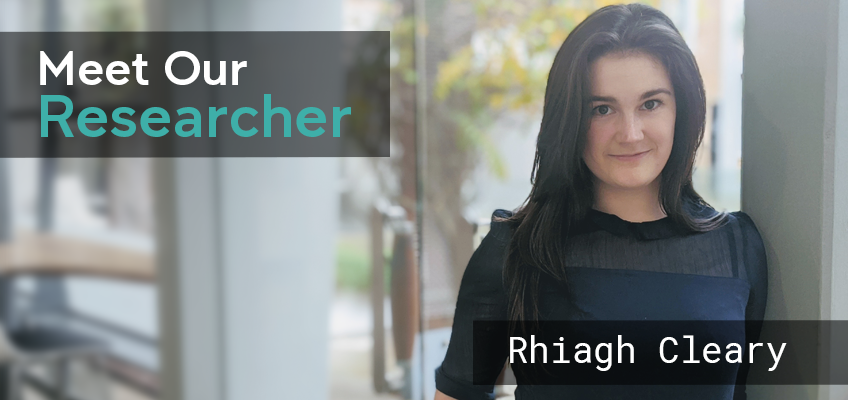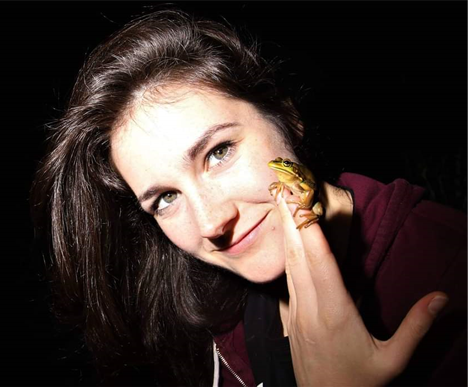20 Jun 2020

Further understanding of social cognition, and how it changes across the lifespan and interacts with cognitive decline, is essential for underpinning risk factors for neurodegenerative diseases such as dementia. Rhiagh Cleary, Research Assistant within CHeBA’s Social Cognition Study, hopes to achieve exactly this, to strengthen the ability of families to cope with and potentially inhibit the effects of such diseases on loved ones.
How did you get into researching the ageing brain?
Trial and error. I followed both what I was interested in and the opportunities that arose. My first career explorations were in research, specifically cancer cell bio-imaging and resistant bacteria and separately regulations, for commercial oil tanks, but I found the work lonely and missed social interactions.
I wanted to continue research, particularly in medical fields, but also have more interaction with people. I also wanted to participate in work that had a degree of social impact. As such, I found myself in psychology. Now, my work is ideal; I can research but also interact with new people on a daily basis and listen to the many stories they have to offer.
Did you experience a ‘defining moment’ which led you to this field?
Yes! I was giving a speech for my master’s degree on psychological trauma and what it does to the body. The speaker that followed me was talking about dementia. I was fortunate enough to have never had anyone close to me diagnosed with dementia, but it meant that everything she spoke about was extremely novel to me and I remember feeling exceedingly saddened by her presentation.
I found myself becoming increasingly engaged and noticing the similarities in the emotional and social capacities in those with late stage dementia and those with extreme trauma histories.
I realised that a big issue that a lot of people face, regardless of the diagnoses, is in the change to their social interactions. Researching how social skills change could really help create solidarity in our communities and support for people enduring a range of difficulties. I did my master’s project in empathy and now, here I am!

Do you have any personal interests or activities which are protective behaviors against cognitive decline?
I am one of those people who does not stop moving. I do a lot of exercise, including weightlifting, boxing and competitive dancing - Modern Jive. Most importantly, I spend a lot of time outdoors. Last year, I spent four days a week living in the bush, over a period of a couple of months. I would come home from work, collect all my camping gear, and head off. I loved the early morning sunrise, going for hikes, the starry night skies and simply just sleeping in the bush in my tent. I do the majority of this on my own but sometimes go with ecologists I have met through UNSW. I enjoy photographing amphibians, reptiles, and the natural scenery. Nature is tremendous for your health.
What are you currently researching?
My primary focus at present is the change in our social skills as we age, such as our ability to understand other people’s thoughts and feelings, how to appraise them and how to adjust our behaviours accordingly. We are creating a timeline for how these social skills are expected to change over the life span and what would be considered a normal change versus an abnormal change.
By tracking ‘normal’ changes in social abilities, we can illustrate the various difficulties and strengths people have at different ages. By defining an abnormal change in social skills, we can more readily detect the onset of cognitive impairments, or diseases, such as dementia.
To do this, we look at the genes and hormones which may be linked to enhanced social skills. We also look at people’s cognitive function and how this interacts with their social functioning.
Why is your research important?
Firstly, we support early detection of disease; we aim for earlier detection of cognitive impairment and diseases, such as dementia, where the first sign is an abnormal change in social functioning. Early detection means that individuals and their families can receive more support and may prevent the onset of the disease from occurring.
Secondly, we create more solidarity within our communities through the development of social engagement and support programmes that people can access.
Finally, we aim to raise awareness of the social needs at different ages. We show the natural trends in the change of social abilities over time so that society can be more informed of the challenges different age ranges may face during social interaction.
What do you love about working for CHeBA and what you are doing?
I love CHeBA, and no, I’m not paid to say that! The thing I love most about CHeBA is the people. I think that you can have the greatest goals in your work but unless you have people around to support you, you are not going to achieve anything. CHeBA is just so collaborative, which means you can interact with anybody on the office floor and gain feedback and help. So, despite a relatively small group, our team feels much larger and has a fantastic cooperative mentality.
I also love that my work makes a difference. Talking with Older Adults every day is very rewarding. I get these glimpses of wisdom and interesting life experiences all the time. The only disappointing aspect is when our interviews conclude as I would rather keep listening to all the historical accounts!
What is the ultimate hope you have for your research?
The main goal of my team’s research is to combat cognitive decline and the social difficulties that occur across various age groups.
However, because I personally work with the older population, I am much more aware of the social difficulties they face. As a first step, I want to raise awareness of the social challenges Older Adults face and promote greater understanding and empathy in our communities. We need community structures that keep them integrated, engaged and which mitigate isolation. I feel the older generation are often underappreciated and underrepresented and we miss out on the large amounts of wisdom and insight they have to offer.
Beyond this, I hope our work can be used in the medical field to help facilitate early detection of illnesses by the notable, initial, abnormal changes in social skills that our team will have underlined. To help people receive earlier diagnosis could be momentous to their treatment and prevention plans.
This interview was undertaken during the COVID-19 self-isolation period. Rhiagh found that walking in the bush and having video calls over dinner with friends supported her mental resilience and kept her feeling socially connected while physically isolated.
Donations are fundamental for critical research to continue following COVID-19.
If you would like to discuss supporting Rhiagh’s work specifically, or would like information
on leaving a legacy via a Gift in your Will, please contact h.douglass@unsw.edu.au.

Rhiagh Cleary is a Research Assistant at CHeBA within the Social Cognition Ageing Study. Her work focuses on exploring the relationship between social cognition, genetics and hormonal markers in older adults and risk of cognitive decline. Rhiagh completed a First-Class Honours in Nanotechnology at Dublin Institute of Technology, Ireland, and a Master of Psychology at University of Essex, UK. Outside of research, Rhiagh has a keen interest in ecology and spends as much of her time as possible in nature photographing amphibians.
